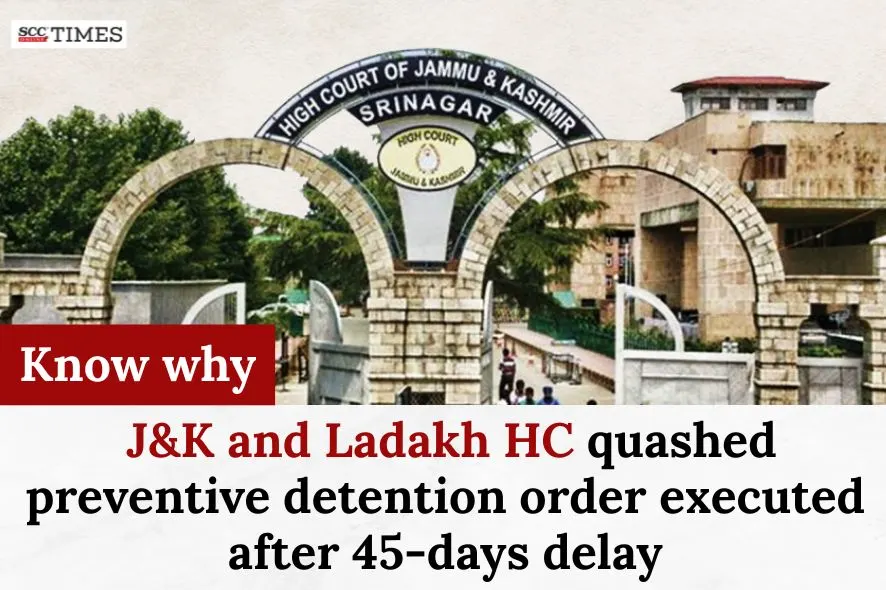Jammu & Kashmir and Ladakh High Court: In the present petition, the father of the detenue challenged the detention order issued by the Divisional Commissioner for involvement in drug trafficking, alleging that the grounds of detention were vague and that the order was executed after a delay of 45 days thereby defeating its object. A Single Judge Bench of Moksha Khajuria Kazmi, J., quashed the preventive detention order passed under the Prevention of Illicit Traffic in Narcotic Drugs and Psychotropic Substances Act, 1988 (‘PIT NDPS Act’), holding that delay in executing the detention warrant without sufficient cause vitiated the order.
Background:
The detenue was placed under preventive detention by an order dated 13-09-2024, issued by the Divisional Commissioner, Kashmir. His father filed a habeas corpus petition stating that the grounds of detention were vague, and the order was issued on mere assertions of the detaining authority. The involvement of the detenue in a case under Sections 8, 20 and 29 of the Narcotic Drugs and Psychotropic Substances Act, 1985 (‘NDPS Act’) mentioned in the grounds of detention had no nexus with him and was fabricated by the police to justify its illegal detention.
The detenue was granted bail by the competent Court, which was contested by the authorities, and the said application was dismissed by an order dated 17-08-2024. The impugned detention order was passed on 13-09-2024, but the detenue was arrested on 28-10-2024. There was a delay of more than 45 days in the execution of the detention warrant, and the detaining authority had not given any reasonable explanation for the delay. The father argued that the delayed execution had lost the proximate link between the detention order and the object sought to be achieved by it, thereby making the order illegal. A representation against the order was filed before the Advisory Board, but it was not considered by the detaining authority. In the grounds of detention, the Divisional Commissioner had mentioned that the detenue was motivating the youth for consumption of drugs to increase his earning, however, the name of any person to whom the detenue had sold the drugs was not mentioned.
The detenue’s father alleged that the impugned order was without subjective satisfaction of the detaining authority, with the order being silent about the name and person of the office in Divisional Commissioner. The executing authority only furnished the copy of the order of detention and copy of the grounds of detention which was not enough to make an effective representation against the detention order as the copies of FIR, dossier, seizure memo and statements recorded under Sections 161 or 164 of the Criminal Procedure Code, 1973 (‘CrPC’) and other relevant materials were not provided.
However, the respondents stated that no legal, fundamental, or statutory right of the detenue was violated. The detenue had transformed into a notorious illicit drug peddler and became the dealer of narcotic drugs and psychotropic substance in his area and was an active member of a larger drug mafia. It was submitted that the detention order was executed by the police concerned and the contents of grounds of detention were read over and explained to the detenue in the language which he understood. The Advisory Board had examined the case and it was only when they found sufficient ground for the detention, the Government in exercise of powers conferred under Section 9(f) read with Section (11) of the PIT NDPS Act confirmed the detention vide an order dated 25-11-2024 and detained him for a period of one year in District Jail, Poonch.
Analysis and Decision:
The Court opined that the law was well-settled that an unreasonable and unexplained delay in executing the detention order would vitiate the detention order, unless such delay was sufficiently explained by the detaining authority. The Supreme Court had time and again laid down that if a detenue satisfied the Court that there was an unexplained delay in execution of the detention order, then such an order would be interpreted as breaking the live-proximity link in between the event of detention and passing of the detention order.
The Court relied on A. Mohammed Farook v. Jt. Secy. to G.O.I., (2000) 2 SCC 360, wherein it was held that “the detaining authority must explain satisfactorily the inordinate delay in executing the detention order otherwise the subjective satisfaction would get vitiated”. The Court also referred to Imtiyaz Ahmed v. State (UT of J&K), 2024 SCC OnLine J&K 878, wherein it was observed that “when there was no proximity or live link between the passing of the detention order and date of arrest of the detenue, it would render the detention order ineffective unless such delay was satisfactory explained”.
The Court noted that no explanation was offered by the respondents to justify the delay in execution of the detention order. The Court opined that if the real intent of the detention order was to prevent the detenue from acting in any manner prejudicial to the public peace, the respondents should not have waited for 45 days to execute it, which cast doubt on the subjective satisfaction drawn by the detaining authority.
The Court observed, relying on Nenavath Bujji v. State of Telangana, 2024 SCC OnLine SC 367, that satisfaction could not be inferred by mere statement in the order that ‘it was necessary to prevent the detenue from committing any of the acts within the meaning of the Prevention of Illicit Traffic in Narcotic Drugs and Psychotropic Substances Act, 1988’.
Consequently, the Court, while allowing the petition, quashed the detention order and directed the respondents to release the detenue observing that there was no live-proximity link between the arrest of the detenue and the order of detention, thereby vitiating the said order.
[Adil Hussain Shah v. State (UT of J&K), 2025 SCC OnLine J&K 1015, decided on 14-10-2025]
Advocates who appeared in this case:
For the Petitioner: Ahmad Javid and Asif Nabi, Advocates.
For the Respondents: Nadiya Abdullah, Assisting Counsel.


